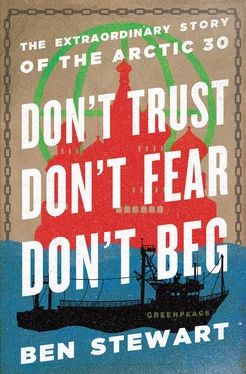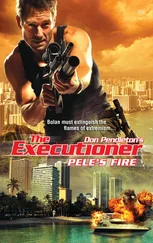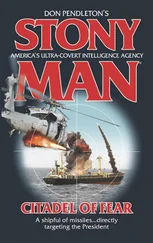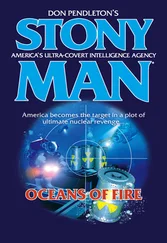Mads Christensen is back on the video link, speaking to his core team. The mood is dark. He has to tell them something to convince them that the fight is not over, that there are still things they can do. ‘We need to increase the strain on the investigators,’ he says. ‘Something to make them totally fed up with this case. Something that makes them wish we’d just go away. This is a war of attrition and we’re more determined. And now we’ve got nothing left to lose.’
He says the legal team has been waiting for the right moment to apply for bail and land the investigators with a mountain of paperwork and a logistical nightmare, and since the charges were re-qualified there’s been a legal justification for doing it. Bail was refused back in Murmansk when they were accused of piracy, but that was two months ago, and now they’re charged with a less serious crime.
‘Bail is such a rare thing in Russia,’ Christensen tells his team. ‘It almost never happens. I want to caution you all, this is a long shot. But if we do it we’ll cause the Russians a real headache. We’ll make them bring everyone to court and defend the arrest and the charges all over again. We need to grind them down. We’ll have to offer a bond and it’ll need to be a high figure, so the courts can’t say we’re not serious. But I think we should do it. We’re going to apply for bail.’
There is a calendar in the Room of Doom that takes up an entire wall. Key upcoming moments are marked in red pen, and around the third week of November there is a riot of scarlet ink. The two-month detention period – handed down in Murmansk – expires on the twenty-fourth. On the twenty-second the ITLOS international court is set to rule on the Dutch application to have the crew released. In the days before that, the FSB will be applying for that three-month extension of detention. And now the Greenpeace lawyers will be piggybacking onto those hearings to apply for bail. The first case will be heard on 18 November.
Mads Christensen decides to offer two million roubles – fifty thousand euros – for every prisoner. But the figure is academic. Hardly anybody thinks the crew will actually get bail.
The news spreads through the SIZOs. The Investigative Committee is keeping them in jail. Sini is told by the Finnish consul, then she goes back to her cell, lies on her bunk and cries all day, cries until she’s so tired she drifts off to sleep with wet and red-raw eyes. She could have done three more months in Murmansk. She could have survived that, with the tapping on the pipe and the shouts over the wall at gulyat . But here in St Petersburg, where she has almost no contact with her friends, she’s not so sure she’ll make it.
Camila hears the news from her lawyer, but by now she feels strong. She feels like she’ll get through this, she knows she’ll survive. It means she’s going to spend Christmas here, and she’s going to spend the Argentine summer here. But she accepts that. Okay, shit, so it’s going to be three months more, she thinks. Whatever.
Frank is taken to the meeting room at Kresty, where two officials from the British consulate are waiting for him. They have books, copies of British newspapers and his favourite magazine, Private Eye . As Frank leafs through the pages of one of the books – it’s about English football – one of the consuls shifts in his seat and says awkwardly, ‘So they’ve applied to extend your detention. Another three months.’
Frank looks up. ‘What do you mean three months?’
‘You’re not getting out anytime soon. I’m sorry.’
Frank crumples, his shoulders slump, his chin drops and he stares at the ground between his boots. His mind races for a moment, it’s performing calculations, working out all the birthdays that are coming up, the ones he’s going to miss. His son’s fourteenth, his daughter’s seventeenth, his partner’s fiftieth, his mother’s ninetieth.
He wraps his arms around his head and bites his lip. He fucked up, he knows that now. It was never heroism. Bravado, maybe, but not heroism. He thought he was inside for doing the right thing, but now he feels reckless. Irresponsible. Selfish. All those missed birthdays.
The consul asks him something but he can’t speak. He can’t even see the man. All he can see are the faces of his kids.
The consul leans forward.
‘Frank,’ he says. ‘You have to listen to me.’
‘Sorry?’
‘I said, don’t you think it’s time for the apology?’
Frank blinks. ‘Sorry, what?’
‘We need to think about an apology.’
‘Apology?’
‘It’s time.’
‘Apologise to who?’
‘Come on, Frank. You know.’
‘Apologise to the FSB? To Putin?’ A spark of indignation fires up somewhere near the back of his skull. ‘Apologise to Putin? You have to be kidding me.’ He sits up straight. ‘What we did was right. It was fundamentally right.’ He bites his lip and shakes his head. ‘No way. I’ll do the time. I’ve got nothing to say sorry for. Nothing.’
Frank Hewetson’s diary
18th November
Just had gulyat and brief shout with Denis. He is off to court this morning to receive notification in court of 3 month extension. What appals me is that he is a Russian citizen, living in Moscow. Not exactly a flight risk!
A letter just got delivered for Anton. It was from his lawyer and did not look like good news. He was quiet a long while. After putting it down he washed his face and towelled himself dry. I’m sure he cried. My god I can only feel lucky not being him. He’s going to the ZONA [labour camp] and the sentence is likely to be 10 years. He’s in his bunk above me, very quiet.
Pete Willcox’s diary
18th November
Got up this morning and saw a beautiful full moon over the church. My cell in Murmansk faced north, so I never saw either the sun or the moon. I have now decided to take the heavenly observations of the last two days as a good sign. Now, I have not always read the signs correctly. Note the rainbows in New Zealand in 1985.
But I am taking this as a good sign. Now we will see what happens.
‘Russell? Colin Russell?’
‘That’s me, fella.’
‘You come now.’
Colin – the 59-year-old Australian radio operator – stands up in a holding cell on the ground floor of St Petersburg’s Kalininsky District Court, where his lawyers are about to argue for his release on bail, and the Russian state will petition for his continued detention on a charge of hooliganism. It is the morning of Monday 18 November and seven of the crew have been brought to two courthouses in white avtozaks with blue stripes down the bonnet and flashing blue lights on the roof.
Colin puts his hands behind his back and turns around so the guard can cuff him. Then he steps out of the cell and he’s led away by three young officers in starched blue uniforms and fur hats. As they round a corner and approach the courtroom, a crowd of journalists raises cameras and microphones, and the air is filled with clicking and questions and shouts from supporters.
In the Arctic 30 campaign hubs in Moscow, Copenhagen, London and Amsterdam, and on laptops around the world, nervous colleagues, friends and family are watching the live video link broadcasting from the courthouse.
Two days ago there were demonstrations in 263 cities in forty-three countries around the world, calling for the release of the crew. In India there were thirty hours of protests across thirty cities. In Germany, huge lantern-lit marches to Russian consulates took place in Berlin, Hamburg, Munich, Frankfurt, Bonn and Leipzig. More than thirty thousand Russians have submitted official complaints to the authorities against the jailing of the Arctic 30, putting themselves at risk of retribution.
Читать дальше












